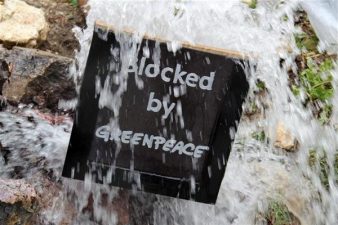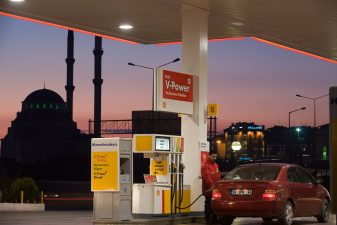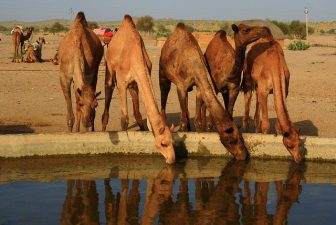 BP to go ahead with deepwater drilling in the Mediterranean Sea, off the coast of Libya, which holds Africa’s largest oil reserves – the 9th largest in the world. Should activists be alarmed? Above: pivot irrigation in the Sahara, paid for by Libyan oil wealth.
BP to go ahead with deepwater drilling in the Mediterranean Sea, off the coast of Libya, which holds Africa’s largest oil reserves – the 9th largest in the world. Should activists be alarmed? Above: pivot irrigation in the Sahara, paid for by Libyan oil wealth.
While a tropical storm approaching the Gulf of Mexico might worsen the BP oil disaster, Libya is going to allow the same company to begin drilling in its offshore deepwater region next month. Shukri Ghanem, the head of Libya’s National Oil Company who serves also as Libya’s de facto Oil Minister, confirmed on June 27 the 2007 agreement with BP, which allows it to drill in the Libyan deepwater region of the Mediterranean Sea. This is despite the negative news about oil pills, not only in the United States, but more recently in the Red Sea, off the coast of Egypt.
Ghanem stated in a Forbes article that although the deaths of those working on Deepwater Horizon and the resulting oil spill were “tragic accidents,” the oil industry is also moving into “new frontiers”.
He said that “an accident will not stop us from digging in this new frontier. Life must go on, but we will learn a lot of lessons.”
According to this exploration and production agreement with BP which was signed on May 29, 2007, BP and Libya’s National Oil Company will explore around 54,000 square kilometers, two kilometers of the onshore Ghadames and offshore frontier Sirt Basins.
During this exploration and appraisal phase, BP will acquire 5,500 kilometers of 2D and 30,000 kilometers of 3D seismic and will drill 17 exploration wells. The initial exploration commitment is set at a minimum of $900 million USD.
During the exploration and appraisal period, BP will spend $50 million on education and training projects for Libyan professionals, which will be designed and managed by Libya’s National Oil Company. If the exploration and appraisal period proves to be successful, BP will spend another $50 million from commencement of production.
BP is noted to be the first ever foreign company to drill in offshore waters for an OPEC (an Organization of the Petroleum Exporting Countries) member.
Libya has a very large amount of oil and is estimated to have the ninth largest oil reserve in the world. According to the Libya Analysis Briefs issued by the US Energy Information Administration in July 2009, “2008 total oil production (crude plus liquids) was approximately 1.88 million barrels per day (bbl/d).”
The Libya Analysis Briefs cites the Oil and Gas Journal, which says that “Libya holds close to 44 billion barrels of oil reserves, the largest in Africa.”
Since Libya is still recovering from many years of US and international sanctions, which were only lifted by the United Nations in 2003 and by the US in 2004, it is no wonder that the Libyan government wishes to increase its oil reserves, production capacity and further develop the natural gas sector. This is why Libya is going ahead with the BP drilling agreement despite the risk that an oil spill such as we witness happening in the Gulf of Mexico might happen also in the Mediterranean.
Read more on Libya:
Boutique Solar Panels Fit For Mosques, Pipelines and Airports
A Sustainable Architecture Conference in Libya
Image credit futureatlas



